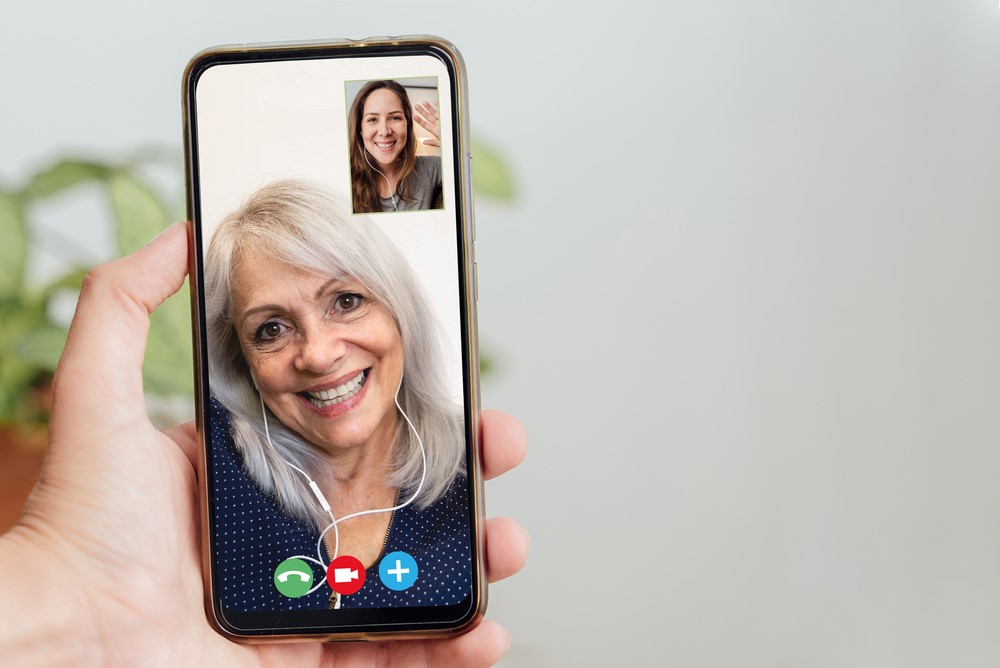
As people age, they often experience a decline in some of their physical abilities. This can include vision and hearing, making using the internet more difficult. In addition, older adults may not be as familiar with technology as younger generations, putting them at a greater risk for online scams and fraud.
This doesn’t mean that seniors should avoid being online, not at all. Technology has become a crucial and positive life-enhancing tool for many older adults, helping them to stay engaged with family, friends, and their community.
However, keeping aging parents safe online is an important task for adult children – as seniors might not understand all the potential risks.
Benefits of the Internet for Seniors
Thanks to the Internet, seniors can stay in touch with family members, get medical information, manage appointments, renew subscriptions, and access medical records without leaving your home. The internet is how people across the world shop and bank.
Despite that reality, common concerns about keeping aging parents safe online are increasing.
According to an analysis by Pew Research Center, older adults are digitally more connected than ever, but adoption rates continue to trail that of younger users, and digital divides persist. The study also showed that 77% of older adults needed coaching when using technology.
Information security is a crucial aspect of keeping seniors safe online, as many scams rely on personal information. However, there are other factors to consider too.
Below are some of the threats that seniors may encounter and some suggestions for keeping them safe.
Critical Ways to Keep Aging Parents Safe Online
Things They Can Do

Use Strong Passwords
Protect your devices, including desktops, laptops, peripherals, workstations, and personal digital assistants, by using strong passwords. Such passwords are also essential for your apps and accounts on social media, devices like other smartphones, your medical or financial portals, and any other combination you can imagine.
Employing a solid password is a practical first step in thwarting identity theft and fraud. Two-factor authentication helps as well, ensuring the senior’s accounts can’t be accessed even if someone has their password.
Comprehensive security software (like LastPass) allows users to store all their passwords and personal information in one place. This approach can be useful for seniors who struggle to remember many different passwords. However, there is still the chance that the security software itself gets hacked.
Some seniors take an analog approach instead, using a physical password book that they keep in a safe place. This means that no one can access their recorded passwords digitally (but, they’re stuck if they lose the book!).
Avoid Scams

Scams targeting retired people are currently a big concern. Indeed, watching out for scams is one of the most important parts of keeping aging parents safe online.
Con artists send messages that appear to be from genuine government agencies, banks, hospitals, brokerages, charities, and bill collectors, but they often take millions of dollars from retirees.
As such, it’s important to verify any links before responding to them or providing personal information. To do so, visit the official site and search for a phone number to call.
Scammers can also send false emails from companies you currently do business with. Some of these scams may be hard to identify as they look and sound legitimate. Before disclosing sensitive information, it might be worth confirming any request received over the phone with the institution and consulting with a family member or friend.
To keep seniors safe, teach them not to open links sent through email and encourage them to ask you about anything that concerns them.
Beware of Dating Scams
With more seniors joining the world of online dating, many scammers have turned their attention to defrauding innocent older adults looking for love. Seniors living on a limited budget may also find themselves more vulnerable.
Watch out for individuals who claim to be from the U.S. but frequently travel or work overseas. Additionally, avoid individuals who profess their love too rapidly and share their problems quickly, but refuse to meet face-to-face.
It’s wise to get some dating tips for senior adults from your family and friends before establishing a relationship with a new person. It will help you figure out your boundaries and learn about the individual you desire to meet.
Photos and videos aren’t enough prove that a potential love interest is real. Scammers often rely on photos they found online. Some even use deepfake technology to create a convincing scam.
Fraud-ridden internet sites look very real today. Look for HTTPS in the address field on your PC or smartphone. The “s,” as in “secure,” refers to a particular security certificate. If the web address is just HTTP, it is probably not secure.
Seniors interested in purchasing online need to dig even deeper. Many sites seem legitimate at first glance, but don’t send what you pay for (or send poor-quality knock-offs).
Reading reviews is essential for finding legitimate sites. Also, avoid sending cash, a cashier’s check, a personal check, or gift cards to online merchants, as these approaches are all indications of a scam.
When buying, always use a credit card just in case there’s something to worry about. This way, if there is an issue, you can contact your credit card company and get transactions reversed.
Alternatively, you might tell the senior not to purchase anything online themselves. Purchasing can be a task you do together. That way there’s no risk that they make a poor decision.
Do Not Share Personal Data
Watch out for emails and websites that ask you for the senior’s Social Security number, telephone number, address, or other personal information.
This even means avoiding social media quizzes that ask for personal information like your pet’s name, the year you were born, or your hometown. Such information may be used to perpetrate identity theft (as the details are often used to prove your identity with banking and similar services).
Things You Can Do

Monitor Financial Accounts
If possible, monitor the senior’s financial records. If you discover suspicious transactions, report them to your bank or credit card company immediately. You can also place a fraud alert on the senior’s accounts to receive alerts about suspected criminal activity.
Secure Home Routers and Devices
Before connecting to your home network, change any default passwords used by the router and any default passwords used for connected devices.
Don’t forget about IoT (Internet of Things) devices. These are technologies that connect to your home network, including security cameras, health monitors, hearing aids, and smart TVs. These technologies are built with sensors or software that can connect and share data with other household gadgets, and each one must be secured to close privacy gaps.
The security of routers is important too, as these help protect the house from threats, regardless of whether other gadgets are connected to the household network.
Install an Antivirus
Think of antivirus software as a safety net. If the senior clicks on a scam link and a dangerous file gets downloaded, the antivirus software should protect them. To get the most benefits, keep the antivirus software updated and ensure it scans the system regularly.
That said, antivirus software is never 100% reliable. It’s still important for the senior to be wise and avoid questionable links.
Consider a VPN
VPNs (Virtual Private Networks) offer an additional level of security by encrypting information sent over the internet. This makes the senior’s information much harder to access and keeps them safer.
A VPN can also hide the senior’s physical location and their identity. These features help with security as well.
There are many decent VPNs out there, including free and paid versions. The service Free VPN by VeePN is a good place to start and even comes with a Firefox addon.
Keep Devices Up-to-Date
Ensure you stay ahead of the game and update the software and apps on the senior’s devices regularly. Doing so helps to keep safe from any security issues.
Offer Assistance Regularly
If you know a senior and want to assist them, consider offering them a shoulder to lean on. It is essential to check in with your older family members and friend when you notice them growing concerned or falling behind in some instances. If you’re considered tech savvy, and nobody in your family is, this might be the perfect opportunity for you to check in with your friends.
Media such as YouTube offers helpful, brief videos for any concerns you might have. Apple and Microsoft stores provide valuable advice in addition to services for their products on their websites. Locate their official portals to access appropriate tech support channels.
Finally, remember to be kind and patient as you work on keeping aging parents safe online. The internet can be a confusing place at times and users don’t always know what they’re doing. If your aging parent falls victim to a scam or makes a bad decision, don’t berate them, simply help them to solve the problem.
Getting angry at them doesn’t help the situation at all and may make the senior less likely to confide in you when they need to.
Further Information About Improving Cybersecurity for the Elderly
Seniors can now remain secure online with a variety of helpful tools! From learning the basics to keeping personal information safe, these resources ensure seniors have all they need to navigate today’s digital world. Many resources can help, including:
- The National Cyber Security Alliance: The National Cyber Security Alliance keeps businesses and consumers informed of the most up-to-date cybersecurity news, giving them access to resources that help protect their data from malicious attacks. By staying one step ahead of evolving technologies, they are dedicated to safeguarding our digital world.
- CyberAware: CyberAware is an essential resource for senior citizens and their loved ones. It provides information on a range of topics, from creating secure passwords to avoiding identity theft – leaving no stone unturned when it comes to digital safety!
- The National Institute of Standards and Technology (NIST): By keeping up with the latest cybersecurity resources from NIST, individuals can secure their online data by creating strong passwords, staying vigilant against phishing attacks, and taking proactive steps to protect personal information.
- Cyber Safe Seniors: This website offers several resources on the basics of cybersecurity, including how to create strong passwords, recognize online scams, and secure mobile devices.
By taking steps to improve cybersecurity and staying safe online, elderly family members can protect themselves from cyber-attacks and enjoy the benefits of being connected. With a reliable VPN provider, creating strong passwords, using two-factor authentication when available, and educating themselves on the latest threats, seniors can ensure their data is secure.
Conclusion
These approaches all help to keep aging adults safe online. The process is important, as scams or fraud can easily lead to financial loss.
Plus, helping seniors to use the internet well and safely is a critical way to keep them connected with friends and family members. The best way to stay safe is simply by knowing how technology works. Having support when things go wrong is important too.
By being vigilant and using caution, your aging parents can enjoy the many benefits that the internet offers while minimizing the risk of being scammed or becoming a victim of identity theft.
Feeling Overwhelmed?
Check out our Caregiving Consulting service for personalized support and guidance.


Leave a Reply